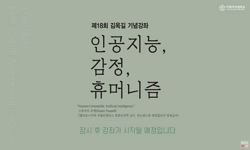Artificial intelligence (AI) represents a significant technological leap within the hotel industry, promising to revolutionize various aspects of operations. However, its full impact remains uncertain, particularly its effect on the workforce. One not...
http://chineseinput.net/에서 pinyin(병음)방식으로 중국어를 변환할 수 있습니다.
변환된 중국어를 복사하여 사용하시면 됩니다.
- 中文 을 입력하시려면 zhongwen을 입력하시고 space를누르시면됩니다.
- 北京 을 입력하시려면 beijing을 입력하시고 space를 누르시면 됩니다.

The Impact of Job Anxiety Caused by Artificial Intelligence Substitution on Organizational Members’Turnover Intention: The Mediating Role of Job Insecurity and the Moderating Effect of Job Uncertainty
한글로보기https://www.riss.kr/link?id=A109137554
- 저자
- 발행기관
- 학술지명
- 권호사항
-
발행연도
2024
-
작성언어
English
-
주제어
인공지능 ; 직무불안감 ; 직무불안정성 ; 직무불확실성 ; 이직의도 ; Artificial Intelligence ; Job Anxiety ; Job Insecurity ; Job Uncertainty ; Turnover Intention.
-
등재정보
KCI등재
-
자료형태
학술저널
- 발행기관 URL
-
수록면
67-103(37쪽)
- 제공처
-
0
상세조회 -
0
다운로드
부가정보
다국어 초록 (Multilingual Abstract)
One notable consequence is the potential erosion of employees' expertise, which often leads to heightened levels of anxiety. As AI takes over tasks traditionally performed by humans, employees may feel sidelined or redundant, uncertain about their future within the organization. This anxiety, in turn, can catalyze turnover intentions, as employees grapple with uncertainties about their roles and career prospects.
Recognizing the importance of understanding these dynamics, this paper aims to delve into the intricate relationship between AI adoption, job anxiety, job insecurity, job uncertainty, and turnover intention in the context of hotel employment. By examining how AI implementation influences employee well-being, this study seeks to provide valuable insights for both industry practitioners and policymakers.
Based on theories of anxiety and coping, this study constructs a comprehensive framework to assess the impact of AI implementation on employee well-being. Leveraging survey data from a diverse pool of 608 hotel employees, the research examines how organizational adoption of AI influences job anxiety levels and subsequent turnover intentions.
The statistical analyses reveal compelling insights into the interplay between AI and employee turnover intentions. Key findings indicate that the introduction of artificial intelligence indeed shapes employees' intentions to leave their jobs. Notably, job anxiety induced by AI substitution emerges as a significant predictor of turnover intention, underscoring the psychological strain experienced by employees amidst technological advancements.
Furthermore, the study unveils the mediating role of job insecurity, wherein heightened anxiety precipitates feelings of job instability, subsequently fueling turnover intentions. As AI continues to permeate the hotel industry, understanding and addressing these workforce dynamics will be crucial for maintaining employee morale and organizational stability in the face of technological change.
Artificial intelligence (AI) represents a significant technological leap within the hotel industry, promising to revolutionize various aspects of operations. However, its full impact remains uncertain, particularly its effect on the workforce.
One notable consequence is the potential erosion of employees' expertise, which often leads to heightened levels of anxiety. As AI takes over tasks traditionally performed by humans, employees may feel sidelined or redundant, uncertain about their future within the organization. This anxiety, in turn, can catalyze turnover intentions, as employees grapple with uncertainties about their roles and career prospects.
Recognizing the importance of understanding these dynamics, this paper aims to delve into the intricate relationship between AI adoption, job anxiety, job insecurity, job uncertainty, and turnover intention in the context of hotel employment. By examining how AI implementation influences employee well-being, this study seeks to provide valuable insights for both industry practitioners and policymakers.
Based on theories of anxiety and coping, this study constructs a comprehensive framework to assess the impact of AI implementation on employee well-being. Leveraging survey data from a diverse pool of 608 hotel employees, the research examines how organizational adoption of AI influences job anxiety levels and subsequent turnover intentions.
The statistical analyses reveal compelling insights into the interplay between AI and employee turnover intentions. Key findings indicate that the introduction of artificial intelligence indeed shapes employees' intentions to leave their jobs. Notably, job anxiety induced by AI substitution emerges as a significant predictor of turnover intention, underscoring the psychological strain experienced by employees amidst technological advancements.
Furthermore, the study unveils the mediating role of job insecurity, wherein heightened anxiety precipitates feelings of job instability, subsequently fueling turnover intentions. As AI continues to permeate the hotel industry, understanding and addressing these workforce dynamics will be crucial for maintaining employee morale and organizational stability in the face of technological change.
동일학술지(권/호) 다른 논문
-
- 한국생산성학회
- 엄금철
- 2024
- KCI등재
-
Affine Nelson Siegel 모형을 활용한 금리기간구조모형 추정
- 한국생산성학회
- 이성빈
- 2024
- KCI등재
-
데이터 산업에서의 사회적 자본이 지식공유, 합리화된 지식은폐, 그리고 혁신행동에 미치는 영향: 리더경계확장행동의 역할
- 한국생산성학회
- 황신희
- 2024
- KCI등재
-
무인점포 고객의 사용의도에 영향을 미치는 요인에 관한 연구: 서비스스케이프와 기술준비도를 중심으로
- 한국생산성학회
- 김봉석
- 2024
- KCI등재




 eArticle
eArticle






